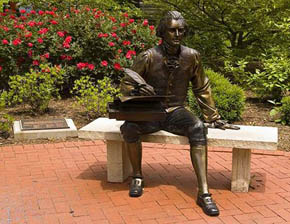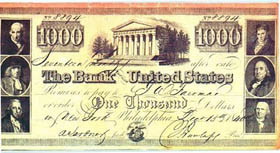LETTERS FROM THE GLOBAL PROVINCE
Jefferson's Garden vs. Hamilton's Bank, Global Province Letter, 22 August 2012
"Nero fiddled while Rome burned"—an ancient, but discredited fable
"The zero-sum property (if one gains, another loses) means that any result of a zero-sum situation is Pareto optimal (generally, any game where all strategies are Pareto optimal is called a conflict game)." ------ Zero Sum Game.
Proceedings at Caffe Dante: Radiant with self-satisfaction after a grueling 45 minutes on various machines at the Fitness Center, we pulled into Caffe Dante for our morning cup of poison, assuring ourselves that our vigorous exercise would negate whatever bad effects might flow from the java. Of a sudden, the scrawny, pleasant, mildly geeky espresso operator broke into a fusillade about the many health benefits of coffee, assuring us that all the outcry against coffee was the devious work of wayward capitalists. You see, coffee house personnel need to feel virtuous, and it would never do for them to think they were serving up something noxious. To no avail, we assured him that the current wisdom on coffee does say coffee may afford a host of health benefits, but that it may still do harm of some consequence to at least a considerable fraction of the population. Such a conclusion poses ambiguity that an ideologue barista cannot endure.
To my right at the counter was an older grinning chap, in his second childhood, who had learned to be sardonic. He allowed: "I only have two vices now, coffee and sex." He knew that coffee is a mixed bag. Everything else sinful had long since gone by the board for him. The goat cheeses and croissant formerly put out by his French wife had disappeared. Their table had turned vegetarian. About wine they no longer spoke. The modern obsession with health had overwhelmed man's inbred devotion to pleasure.
Deck Chair Health Measures. Of course, these days, young and old, rich and poor, farmhand or city slicker, we are all making petit adjustments in our daily regime with the hope our fiddling may give us a year or two more of life and a modicum of happiness. One wag, however, has determined that the extended lease on life we gain from visiting the gym exactly equals, in hours, the stupendous time we lose in mindless exercise on the treadmill. Some of our exertions are for naught.
He has a point. Many of our 'fitness' gestures simply mean we are moving the deck chairs about on our sinking ocean liner. Our tinkering with diet or exercise helps a bit, but it is hard to be very healthy in a stridently unhealthy society. We breathe pretty bad air and absorb chemicals from land, and sea, and the atmosphere. Sitting too long, and most of us have developed bureaucratic posteriors, has turned us into jelly. Cellphones and all the other apparatus of the new digital virtual world impose burdens on our bodies we do not understand. Media most foul and the other seedy stuff of daily communication contribute to the growing epidemic of mental depression that weighs on our souls. Our existence is riddled with unfriendly currents, and our little individual attempts at better living cannot reckon with a society run amuck.
These days we try to tinker with the machinery of our life. But that's not enough. Nothing short of a wholesale reinvention of the system in which we live will give us ease. And thus we spend an ungainly amount of money on health, but our society grows less healthy. The leverage now comes not from minor little patches of this and that, but from wholesale changes of a whole array of systems that control our daily lives. Incrementalism today is an instrument of self-delusion.
Jeffersonian Democracy vs. Hamilton's Urban Capitalism. At the beginning of the Republic, it was fairly clear that we were an agrarian nation and that our worship of husbandry and fields of plenty knit together our diverse people. Charmingly, Andrea Wulf in Founding Gardeners illustrates how our agricultural bonds drew together our forefathers, who were often at loggerheads, but who were also wedded together by their love of the land and the vast natural world which was America. Jefferson and his allies thought that the forested country was America's strength and resisted the urban and financial power symbolized by the great Alexander Hamilton. In the long run, of course, Hamilton won and so we are overwhelmingly an urban country in the 21st century with a financial sector that exerts too much power over our life.
The Big Short. And the bankers of all stripes—commercial, investment, private equity—have gone astray and run us over a cliff. The citizen who wants to understand this need only read Michael Lewis's The Big Short. There one can inspect a financial system that is rotten at the core. Products that were clearly worthless were foisted on investors. Bundles of flawed mortgages, which would never get paid, were repackaged as bonds and then peddled to institutions and investors alike. Earnings from structured finance became so big a part of Wall Street profits that the firms in lower Manhattan, as well as in midtown, would have shriveled up without sales of the totally hollow products ginned up around housing. This unpunished illegitimacy was exacerbated by Alan Greenspan, our worst Federal Reserve Chairman ever, who, it is often said, never saw a bubble he didn't like, never saw a bubble at which he did not throw cash. It is hard to have a healthy society when such a huge part of it—the financial community—is living a lie.
Importantly not much of the financial house of horrors has been altered but the cosmetics. Those who pilfered often are still in place, and many of their henchmen left the Street with millions in their pockets. The bad guys have not gone to jail. Some tinkering has been done but our financial system has not been really reinvented, as it needs to be. As Lewis says, "What are the odds that people will make smart decisions about money if they don't need to make smart decisions—if they can get rich making dumb decisions?"
Recapturing our Pastoral World. It would seem that we need to recapture some of Mr. Jefferson's lost world where the air and circumstance of the farm are restored, even to the extent of bringing greenery and farms and growing into urban spaces. Certainly this would push back against the financial community, which has created nothing over the last 10 years except fraudulent products. It has sold air at very stiff prices.
But in particular we learn that trees alone are rather key to the very survival of man on this planet. Jim Robbins in The Man Who Planted Trees essays a bit about David Milarch, off the farm in Michigan, who is striving to collect and replicate giant healthy examples of all the tree species so that they will not die off, but last for time eternal. This rather undisciplined book wanders quite a bit and is as much about the tree's essential contribution to the earth which ranges from cleaning up unwieldy gases to filtering wastes in streambeds to inhibiting the spread of disease amongst humankind.
From it, we sense that we need our rural life and wild spaces, not just to resist a dangerously flawed urban culture. We need our gardens and our trees if we are to have any life at all. Just tinkering with the landscape won't save the day either. We need a Teddy Roosevelt who puts big swathes of green in unlikely places.
The trick in an ever more complex society is not to engage in zero sum games of a thousand chess moves where nobody gains a thing. We need big changes.
P.S. Jefferson talked the talk, and walked the walk. The Virginia planters, to include Jefferson, nurtured tree and garden. See Thomas Jefferson's Revolutionary Garden.
P.P.S. Hamilton's vision for the United States was personified by the First Bank of the United States, which he really established. Though it was a creation of the Federal Government and partially funded by it, it had, unlike the Bank of England, commercial interests and hence was somewhat mercantilist in character. Hamilton was a brilliant federalist and surely a patriot and yet he suffered from a need to imitate the European societies from which America was breaking away.
Hamilton's vision for the United States was personified by the First Bank of the United States, which he really established. Though it was a creation of the Federal Government and partially funded by it, it had, unlike the Bank of England, commercial interests and hence was somewhat mercantilist in character. Hamilton was a brilliant federalist and surely a patriot and yet he suffered from a need to imitate the European societies from which America was breaking away.
P.P.P.S. Part of the charm of the Argentines is that they live in a different world than we do. It is imbued with fantasy, a romantic escape from a society that has been in decline for 100 years. To deal or not deal with the world as it is, they also see psychiatrists in record-setting numbers, as we have mentioned before. Even the New York Times has begun to marvel at the time they spend on the couch. Yet we can wonder: maybe they have a leg up on us, since depression is so endemic and yet so untreated in advanced societies. Perhaps they are showing the rest of us the way forward by leading us to the couch.
P.P.P.P.S. We have created some parallel universes in our land that subsist apart from bricks and mortar, from real products, from forest and farms. The virtual Internet world does not work that well, and it drags us away from real people and real things. So, too, does the world of finance, which is surreal and egregiously at odds with everyday reality. These are alternate worlds that tend to squeeze trees and people and sunshine out of our lives.
P.P.P.P.P.S. Sebastian Thrun interviewed in the Wall Street Journal. "I ask why he always takes on these quantum changes instead of trying something incremental. 'That's what Google taught me. Aim higher. Udacity is my playground--to radically experiment and find out. I've seen the light.'"
Home - About This Site - Contact Us
Copyright 2012 GlobalProvince.com